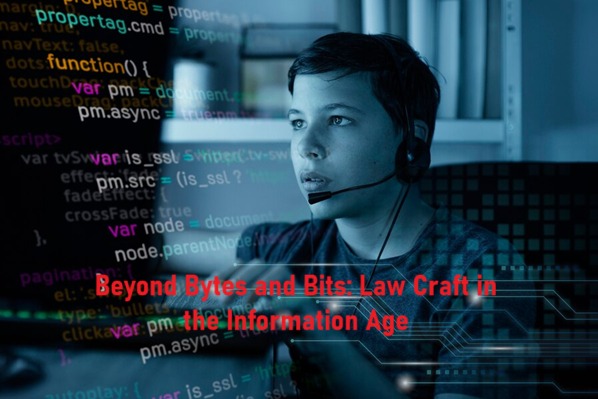The world is more connected than ever before. Technology governs how we work, socialize, shop, and even how governments function. But with this massive shift into a digital age, the way we understand and create laws has also had to evolve. Welcome to the era of “Beyond Bytes and Bits: Law Craft in the Information Age,” where legal frameworks and technology intersect to address challenges we couldn’t have imagined decades ago. This blog explores how laws are crafted to manage, regulate, and thrive in this ever-changing digital landscape.
The Information Age: A Game-Changer for Legal Systems
The Information Age, driven by the internet, data, and digital technologies, has transformed nearly every aspect of human life. For the legal system, this transformation is both an opportunity and a challenge. New technologies create new possibilities, but they also introduce unique risks, including privacy concerns, cybersecurity threats, and ethical dilemmas.
Imagine a time when cybercrimes didn’t exist because there were no cyberspaces to commit them in. That was just a few decades ago. Now, with data breaches, hacking, and online fraud running rampant, lawmakers have had to step up their game to address these modern concerns. In this section, we’ll examine how technology has reshaped the core responsibilities of lawmaking.
Key Challenges of Crafting Laws in the Digital Era
- Keeping Up with Rapid Technological Advancements: Technology moves fast—really fast. By the time a law is drafted, debated, and passed, the tech it was meant to regulate may already be outdated.
- Global Scope of Technology: Technology knows no borders, but laws often do. How can governments regulate global platforms like social media, e-commerce, and cryptocurrencies?
- Balancing Innovation and Regulation: Too much regulation can stifle innovation, but too little can lead to chaos. Finding the right balance is always a challenge.
- Ethics and Human Rights: How do we ensure that the laws protecting our rights offline also apply online? This becomes especially tricky with issues like AI decision-making and facial recognition.
Building Legal Frameworks for Emerging Technologies
New technologies call for new laws. Here are some of the key areas where lawmakers are stepping up their efforts:
1. Data Privacy Laws
Data is the lifeblood of the Information Age, but with great data comes great responsibility. Laws like the European Union’s General Data Protection Regulation (GDPR) and California’s Consumer Privacy Act (CCPA) have set the gold standard for data privacy. These laws give people control over their personal data, ensuring companies handle it responsibly.
Why It Matters: Imagine your personal data—credit card info, browsing history, or medical records—being sold to the highest bidder without your knowledge. Data privacy laws aim to prevent that.
2. Cybersecurity Regulations
As more of our lives move online, the risk of cyberattacks grows. Governments are introducing stringent cybersecurity requirements to protect critical infrastructure, businesses, and individuals from hackers.
Example: The Cybersecurity Maturity Model Certification (CMMC) in the U.S. ensures defense contractors meet certain security standards to protect sensitive government data.
3. AI and Machine Learning Policies
Artificial Intelligence (AI) is no longer science fiction. It’s here, and it’s changing how we work and live. But with AI comes questions about accountability, bias, and transparency. Lawmakers are working on frameworks to govern AI’s use and prevent abuses.
Example: The European Commission’s proposal for an AI Act aims to ensure AI systems are trustworthy, transparent, and human-centric.
4. Digital Currencies and Blockchain
Cryptocurrencies like Bitcoin and Ethereum are disrupting traditional finance. Blockchain technology, which underpins these currencies, also has applications in areas like supply chain management and voting systems. Governments are trying to regulate this space without stifling innovation.
Example: Countries like El Salvador have embraced Bitcoin as legal tender, while others are focused on creating Central Bank Digital Currencies (CBDCs).
The Role of International Collaboration
Technology is global, so legal frameworks often need to be global too. International organizations like the United Nations and the World Economic Forum are playing crucial roles in bringing countries together to address challenges like cybersecurity, digital privacy, and online misinformation.
Case Study: The Budapest Convention
The Budapest Convention on Cybercrime is the first international treaty aimed at combating cybercrime. It provides a framework for countries to work together, sharing information and resources to fight online crimes.
Making Laws Accessible in the Digital Era
The way laws are communicated has also evolved. No longer limited to lengthy legal texts, many governments are using digital platforms to make laws more accessible and understandable to the public. Websites, apps, and social media campaigns help citizens stay informed about their rights and responsibilities in the digital world.
Example: India’s “Digital India” initiative includes efforts to educate citizens about cybersecurity and data privacy through online portals and outreach programs.
What Does the Future Hold?
As technology continues to evolve, so will the laws that govern it. Here are some trends to watch:
- Quantum Computing: Quantum computers could break current encryption methods, necessitating new cybersecurity laws.
- Space Law: As private companies like SpaceX and Blue Origin expand into space, new regulations will be needed to govern activities beyond Earth.
- Metaverse Governance: Virtual worlds like the metaverse will require their own set of rules to address issues like property rights, privacy, and online behavior.
Conclusion
Crafting laws in the Information Age isn’t just about bytes and bits; it’s about understanding how technology impacts our lives and finding ways to protect and empower individuals in a digital world. As we navigate this complex landscape, collaboration between governments, tech companies, and citizens will be key.
The future is digital, and so is the law. Whether it’s protecting your data, ensuring ethical AI, or managing cryptocurrencies, the legal frameworks of tomorrow will shape the world we live in. Let’s make sure they’re crafted wisely, keeping humanity at the heart of technology.
